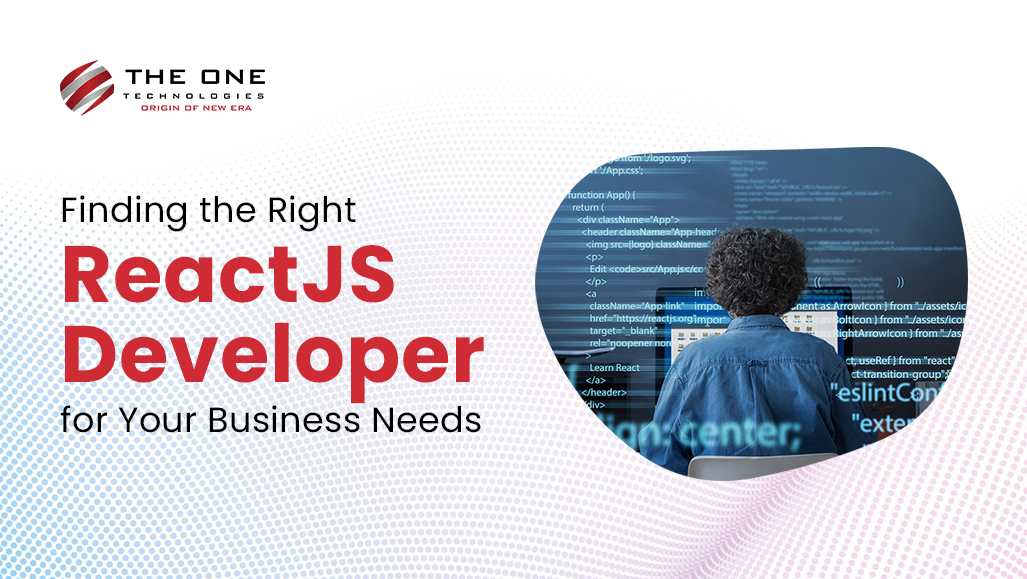Finding the Right ReactJS Developer for Your Business Needs

With its efficiency and speed, ReactJS has carved out a place as one of the world's most efficient, scalable, and stable front-end libraries in rapid web and application development. Developed by Meta, ReactJS allows developers to create dynamic, high-performance user interfaces with reusable components, making it indispensable for modern web applications. If your business is looking to create or recreate a web product, partnering with an experienced ReactJS development company can make or break the success of your venture. This helpful blog will guide you in aligning the best ReactJS talent with your business goals.
Why ReactJS?
Before diving into the process, it’s important to understand why ReactJS is a preferred choice:
- Component-Based Architecture: Promotes reusability, easier maintenance, and faster development.
- Virtual DOM: Improves performance by rendering only what’s needed.
- Strong Ecosystem: Backed by a large community, frequent updates, and a rich set of libraries.
- SEO-Friendly: With server-side rendering (e.g., using Next.js), React apps can be optimized for search engines.
- Cross-Platform Development: React Native enables mobile app development using the same skillset.
ReactJS can be used as a front-end framework. For complex enterprise applications, scalable SaaS platforms, or MVPs.
Step 1: Define Your Project Requirements
Start by outlining what you want to achieve. Consider these key questions:
- What type of product are you building (web app, dashboard, e-commerce site, etc.)?
- What features and functionality do you need?
- Are there any specific libraries, tools, or integrations required (e.g., Redux, GraphQL, TypeScript)?
- What is your timeline and budget?
Whether you need a senior React architect to oversee a large-scale build or a junior developer for basic components. This clarity will help you determine what level of knowledge and experience you require.
Step 2: Determine the Engagement Model
There are several ways to bring a ReactJS developer on board:
- In-House Hiring: Best for long-term projects or products requiring close collaboration.
- Freelancers: Cost-effective for short-term or one-off assignments.
- Development Agencies: Ideal for end-to-end project execution with a full-stack team.
- Staff Augmentation: Hire dedicated ReactJS resources who work as an extension of your team.
Choose the model that aligns with your budget, timeline, and collaboration style.
Step 3: Evaluate Technical Skills
ReactJS development isn't just about knowing React, it's about mastering the ecosystem. Look for the following core skills:
- Strong grasp of JavaScript (ES6+)
- Proficiency in React fundamentals (components, hooks, state management, lifecycle methods)
- Experience with Redux or Context API for state management
- Familiarity with RESTful APIs and GraphQL
- Knowledge of front-end build tools (Webpack, Babel, Vite)
- Testing experience with tools like Jest, React Testing Library
- Version control (Git, GitHub/GitLab)
- Basic understanding of UX/UI principles
Bonus points for experience with TypeScript, server-side rendering (Next.js), performance optimization, and CI/CD pipelines.
Step 4: Assess Soft Skills and Cultural Fit
While technical skills are vital. A developer's soft skills and alignment with your company’s culture can significantly affect productivity and collaboration. Consider:
- Communication: Can they explain complex technical decisions clearly?
- Problem-Solving: Are they proactive in identifying and resolving issues?
- Adaptability: Can they work in Agile/Scrum environments?
- Team Collaboration: Do they play well with designers, PMs, and backend engineers?
Ask situational questions in interviews or give small take-home assignments to evaluate how they think and work.
Step 5: Review Their Portfolio and Code Samples
Past work is often the best indicator of future performance. Ask for:
- Links to live projects or GitHub repositories
- Code samples or components they’ve built
- Client testimonials (if freelance or agency-based)
Pay attention to code readability, modularity, and documentation. A good ReactJS developer will write maintainable, scalable code.
Step 6: Start with a Trial Project
If you're not sure about a candidate or agency, begin small. Give them a trial task, perhaps writing a feature or debugging a bug in your current codebase. This practical test will uncover their coding ability, response time, and communication skills.
The Conclusion
Getting the right ReactJS developer isn't merely a matter of checking technical boxes. It's about someone who gets your vision, can fit into your team, and can produce quality code effectively. Take the time to articulate your needs. Screen thoroughly and establish a solid developer relationship. With the right ReactJS skills on board, whether from an in-house expert or a trusted ReactJS development company, your online product will be poised for performance, scalability, and user satisfaction. Ultimately, keeping you ahead of the game in the competitive digital space.
Need Assistance in Hiring? No matter whether you are in search of a freelance project or a dedicated development team. We can assist you in finding the right ReactJS developers that suit your business needs. Share your requirements with us today!









